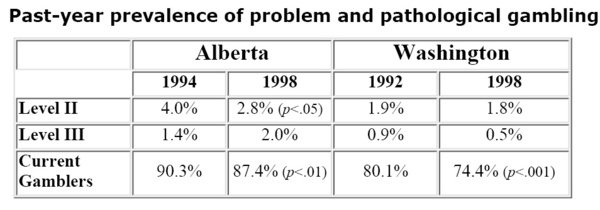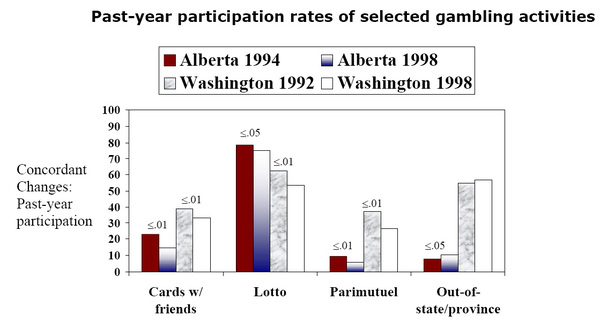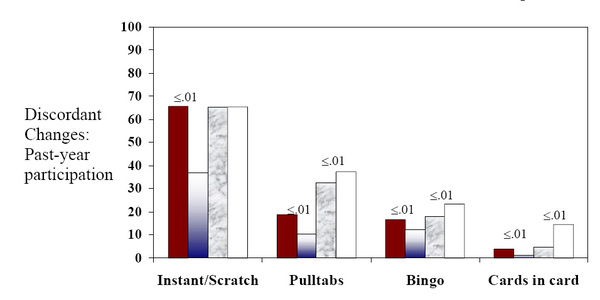The WAGER, Vol 4(30) – Changes Across Time: Two Replication Studies
A primary benefit of longitudinal and replicative studies is the ability to track parameters across time. Having multiple longitudinal and replicative studies provides an even greater benefit: the ability to compare changes in parameters for one population to those of another. In 1998, Wynne Resources of Edmonton published a study examining the prevalence of gambling behavior in Alberta.1 The research was conducted as a replication of a 1994 study conducted by the Alberta Alcohol and Drug Abuse Commission. Similar work was conducted by Volberg and Moore (1998) in the state of Washington, replicating their own 1992 study.2 Both studies utilized telephone interviews with large samples (1000-2000 respondents). The table and charts below present selected changes of prevalence for various categories. P-values are reported for all statistically significant relationships.
Three points should be discussed: First, both Alberta and Washington experienced a significant decrease in the rate of past-year gambling. Second, with the exception of level II (problem) gambling in Alberta, we cannot conclude that the prevalence of problem and pathological gambling have changed since the initial studies. Although rates may appear to have generally decreased, when subjected to statistical hypothesis testing, we cannot rule out the possibility that no change occurred. Third, in both regions, lotto, parimutuel wagering and playing cards with friends decreased discernibly. Future research might search for common elements of these activities that could explain the waning popularity of these games. Third, trends in participation in instant/scratch tickets, pulltabs, bingo, and playing cards in card rooms were discordant between the two populations. That is, changes were found in both territories, but they were in opposite directions. Perhaps future studies could try to discover what differences between the populations, if any, are responsible for this phenomenon. Furthermore, it would be interesting to apply this kind of analysis to replication studies from other areas. 


Sources: 1 Alberta Alcohol and Drug Abuse Commission. (1998). Adult gambling and problem gambling in Alberta, 1998. Edmonton, Alberta: Wynne Resources, Ltd. 2 Washington State Lottery. (1998). Gambling and problem gambling in Washington State: A replication study, 1992 to 1998. Northampton, MA: Gemini Research, Ltd.
The WAGER is funded, in part, by the National Center for Responsible Gaming, the Massachusetts Council on Compulsive Gambling, the Andrews Foundation, the Addiction Technology Transfer Center of New England, the Substance Abuse and Mental Health Administration Services, and the Center for Substance Abuse Treatment.